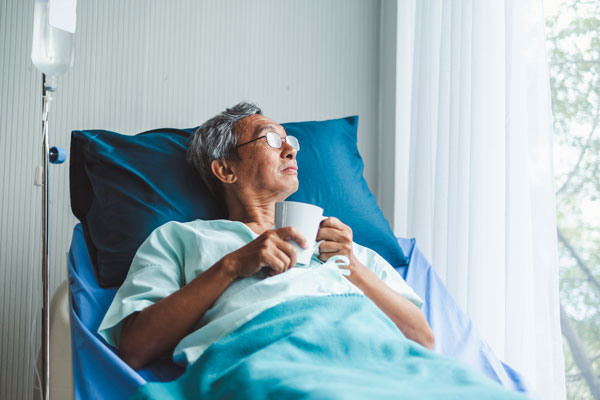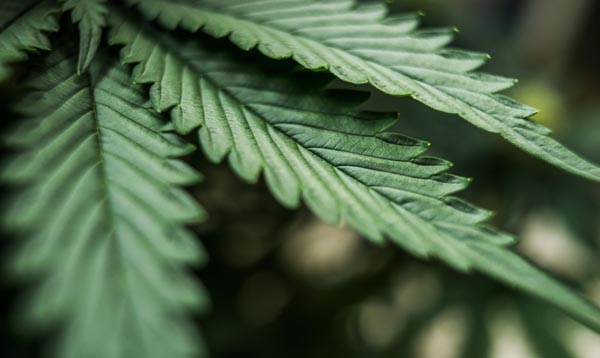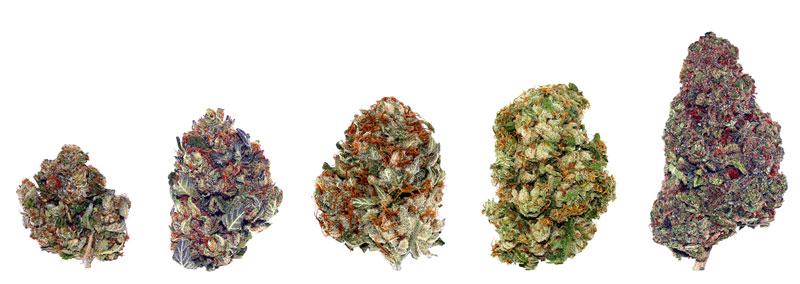End-of-Life & Palliative Care
One of the hardest questions for anyone to answer is if they would prefer to know how much time they have left to live.
 Regardless of the answer, learning the amount of time that someone has left to live is never an easy piece of information to receive. It can be a very emotional and challenging time for both the person receiving the diagnosis and for their family and friends who are closest to that person.
Regardless of the answer, learning the amount of time that someone has left to live is never an easy piece of information to receive. It can be a very emotional and challenging time for both the person receiving the diagnosis and for their family and friends who are closest to that person.
While everyone has their own individual ideals as to what the end-of-life care for themselves or their loved ones should be like, one thing that almost everyone can agree on is that the process should be as pain-free and peaceful as possible.
This is accomplished by keeping people as comfortable as possible, providing medications to eliminate as much pain as possible and allowing friends and family members the ability to say goodbye to their loved one before they pass away.
When it comes to choosing the best end-of-life care for yourself or a loved one, it is important that you are familiar with all your options before choosing how you wish to move forward. One form of therapy that has been gaining popularity in recent years is the use of medical cannabis during the end-of-life care for many different terminal illnesses.
Is medical marijuana an option for you or your loved one when it comes to end-of-life care?
In this Kanteeva article, we are going to look at what terminal illness is, what some of the symptoms of terminal illness may be and how medical cannabis can help manage those symptoms. It is our goal to provide you with the information that you will need to make an educated decision on whether medical cannabis is an option for your individual needs or the needs of a loved one.
After reading this article, you should have a basic understanding about medical cannabis and terminal illness so that you are able to further discuss your options with your healthcare provider(s).
If you have any additional questions or concerns after reading this article, please leave them in the comments area below and a Kanteeva team member will respond back to you as soon as possible.
What Is a Terminal Illness?
 Marie Curie defines a terminal illness as:
Marie Curie defines a terminal illness as:
a disease or condition which can’t be cured and is likely to lead to someone’s death.
Terminal illnesses may also be referred to as a “life-limiting” illness but regardless of the name used coping with a diagnosis of terminal illness is never easy.
There are many different ailments that are often considered a terminal illness.
Examples of terminal illness include advanced cancer, the late stages of dementia, lung disease, neurological diseases like Parkinson’s and advanced heart disease, just to name a few.
Any ailment that will result in the likely death of the person suffering from it is considered a terminal illness.
The primary difference between the multitude of ailments that can be considered a terminal illness is the amount of time someone has left before their death, which can vary anywhere from a few days to several years or longer.
How Are Terminal Illnesses Currently Treated?
 Terminal illnesses are treated in a variety of different ways depending on the specific ailment that a person is suffering from. For example, people suffering from advanced dementia or Alzheimer’s disease will have completely different medication regimens and overall plans of care than someone suffering from Parkinson’s disease or terminal cancer.
Terminal illnesses are treated in a variety of different ways depending on the specific ailment that a person is suffering from. For example, people suffering from advanced dementia or Alzheimer’s disease will have completely different medication regimens and overall plans of care than someone suffering from Parkinson’s disease or terminal cancer.
While every terminal illness has its own unique plan of care in the beginning, during the final stages of the ailment most people are put into a specific type of care regimen.
In the medical world, this type of care is often referred to as palliative care, comfort measures or end-of-life care.
The main goal of palliative care is always the same: to ensure that the person receiving end-of-life care suffers as little as possible. This is achieved by trying to control pain, encouraging rest and helping both the person suffering from the condition as well as their family transition as smoothly as possible through this difficult time.
Presently, this is accomplished by using medications designed to encourage rest and alleviate pain while also providing care designed to keep people as comfortable as possible.
Sadly, this usually results in patients becoming too heavily medicated to stay awake or communicate with others and can often result in families feeling as though they are unable to say goodbye to their loved ones before they become completely unresponsive.
Many of these medications come with significant side effects like nausea and vomiting associated with chemotherapy drugs or the narcotic induced constipation associated with narcotic pain relievers that are often used during palliative care.
Because of the terrible side effects that are associated with many medications prescribed for end-of-life care, many people are beginning to look at medical cannabis as an option for their own palliative care or palliative care for a loved one.
How Medical Cannabis can Help During Palliative Care
 You may want to consider medical cannabis as an option during palliative care for yourself or a loved one because it has the potential to help alleviate some of the typical symptoms that palliative care addresses.
You may want to consider medical cannabis as an option during palliative care for yourself or a loved one because it has the potential to help alleviate some of the typical symptoms that palliative care addresses.
Pain
One of the key factors that palliative care tries to address is pain. While this is normally done with narcotic medications, medical cannabis has been shown to help alleviate pain without many of the side effects associated with narcotics. For more information about medical cannabis and pain management, please review our article on medical cannabis and chronic pain.
Constipation
Constipation is often a symptom that must be addressed in palliative care both due to the ailment and the side effects of many narcotic pain relievers. A study published by the American Gastroenterological Association concluded, “In a nationally representative sample of community dwelling US adults, recent marijuana use was associated with decreased risk of constipation.”
Loss of Appetite, Weight Loss or Wasting
Another major concern during palliative care is loss of appetite which can result in significant weight loss or wasting away of body tissue or muscle mass. Many cannabis strains are known to cause a significant increase in appetite, often referred to as “the munchies.”
Insomnia
Palliative care is often aimed at assisting patients to become as comfortable as possible and encouraging rest. Medical cannabis has been shown to be effective at helping to alleviate the symptoms associated with insomnia. For more information on medical cannabis and insomnia, please see our article on medical cannabis and insomnia.
Why Medical Cannabis may be a Better Option
 As you can see from the list above, medical cannabis offers the potential to help alleviate many of the symptoms that are often experienced by people who are receiving palliative care.
As you can see from the list above, medical cannabis offers the potential to help alleviate many of the symptoms that are often experienced by people who are receiving palliative care.
However, unlike many other medications typically associated with palliative care, medical cannabis acts as a sensory enhancer. This can often lead to many people gaining an increased appreciation of sounds like music, the taste and smell of food and the overall environment around them.
Perhaps more important is that many people report that medical cannabis allows their loved ones to still be able to communicate with family members, friends and caregivers while receiving palliative care.
It is important to also note that many strains of medical cannabis have been known to cause feelings of euphoria, according to the medical cannabis community. These euphoric feelings can help to ease the mind, body and spirit as individuals come to terms with their fate.
The approval of medical cannabis for palliative care is not only limited to patients and family members in the medical cannabis community. One study published in the Journal of Palliative Care conducted a survey of 310 hospice professionals and concluded:
the data suggests overwhelming support for medical cannabis use in the hospice setting.
In fact, according to Forbes in reference to the study:
Of all responders, an overwhelming 91% indicated that they support using MC (medical cannabis) for hospice patients.
No matter how you look at it, this is a very high approval rate among healthcare providers and is much higher than normal when it comes to discussing medical cannabis therapy for any other ailments.
An Important Consideration
 If you are considering adding medical cannabis to your own palliative care, or for the palliative care of a loved one, the most important consideration that you need to make is how effective it may be at alleviating some of the many symptoms associated with the process of dying without causing additional side effects like those often associated with narcotic pain relievers and other medications frequently used during palliative care.
If you are considering adding medical cannabis to your own palliative care, or for the palliative care of a loved one, the most important consideration that you need to make is how effective it may be at alleviating some of the many symptoms associated with the process of dying without causing additional side effects like those often associated with narcotic pain relievers and other medications frequently used during palliative care.
The most important thing that you can do is have an open conversation with your healthcare provider(s). While it is always important to discuss your options with your healthcare provider(s), it is especially true when considering adding medical cannabis to a palliative care regimen.
This is because many healthcare providers who took part in the study mentioned above also stated that they would often not initiate conversations about medical cannabis use during palliative care. According to Forbes:
most respondents indicated that hospice physicians discuss MC with patients only if specifically asked.
This means if you are interested in using medical cannabis during palliative care, you will most likely have to be the one to initiate the conversation with your healthcare provider(s) as many are still uneasy to do so even if they support the idea of using medical cannabis for end-of-life care.
What Are the Best Cannabis Strains for Palliative Care?

When it comes to palliative care, there are a multitude of symptoms that need to be taken into account. Because of this, we have chosen strains that offer the ability to handle several of the symptoms associated with palliative care.
As always, it is important that you discuss your options with your healthcare provider(s) before starting any kind of new medication regimen, even medical cannabis.
Top Strains for Palliative Care
We base our strain recommendations on testimonials from medical cannabis community members, anecdotal research, scientific research and a variety of other factors like accessibility.
Pennywise
This Indica Dominant Hybrid is popular among the medical cannabis community and features a 1:1 ratio of THC to CBD that ranges from 12% to 15%. It is often referred to as a great strain for anxiety, depression and pain, while it is also known to have a euphoric effect that leaves consumers feeling uplifted and focused. These are all qualities that make the Pennywise strain an ideal candidate for palliative care.
Chemo Kush aka Chemo
This Indica strain has a very high THC concentration that averages 21%. It is believed to have been originally created to help people find relief from the symptoms of chemotherapy. While many people among the medical cannabis community claim that it is an amazing strain to help alleviate pain, it is best consumed during evening hours as it is known to leave users feeling sedated and couch locked. Beginners to medical cannabis should be careful when first consuming this strain as it does have very high THC concentrations.
Blue Widow
This Sativa Dominant Hybrid is a popular choice among the medical cannabis community for managing multiple symptoms that are often present during times of palliative care. It has medium THC concentrations that range from 12% to 16%. Many medical cannabis community members claim this strain is ideal for daytime use as it leaves you feeling euphoric, relaxed and focused without feeling too sedated. Many users claim that this strain is great for pain, nausea and lack of appetite which makes it a top candidate for palliative care.
Green Crack (aka Green Cush)
This Sativa Dominant Hybrid is known for causing an uplifting effect when consumed. While it does have a high THC content that averages 17%, it delivers a high that many medical cannabis community members say is joyful and euphoric. When it comes to palliative care considerations, this strain is known for alleviating pain, fatigue and loss of appetite, according to medical cannabis community members.
Final Thoughts
 Facing the diagnosis of a terminal illness can be overwhelming for even the strongest people. If you or a loved one have been diagnosed with a terminal illness and are looking at the possibility of palliative care, you should always be able to enjoy life to its fullest regardless of how much time you have left.
Facing the diagnosis of a terminal illness can be overwhelming for even the strongest people. If you or a loved one have been diagnosed with a terminal illness and are looking at the possibility of palliative care, you should always be able to enjoy life to its fullest regardless of how much time you have left.
While palliative care is designed to provide the most comfort and respect possible, many existing medications leave people feeling groggy, confused and ultimately unresponsive.
With growing support from healthcare providers and continued scientific research on how medical cannabis affects many of the symptoms associated with terminal illnesses, there is now more evidence than ever before that demonstrates how medical cannabis may be an ideal option to increase quality of life when dealing with the end stages of a terminal illness.
If you are interested in starting a medical cannabis program to help with palliative care and the symptoms of a terminal illness for yourself or a loved one, we strongly suggest that you speak with your healthcare provider(s) and join the Kanteeva community for other helpful information from other patients and practitioners.
We Want to Hear from You
 Have you or a loved one found relief from the symptoms of a terminal illness by using medical cannabis? If you have, we would love to hear from you!
Have you or a loved one found relief from the symptoms of a terminal illness by using medical cannabis? If you have, we would love to hear from you!
Please help us spread the word about the amazing benefits that medical cannabis patients are finding all over the world by becoming part of the community.
With your help, thousands of others could finally find relief too.
Please share your stories, comments, and questions below. If you are a medical cannabis patient, please also mention what strain has been effective at helping you find relief.
Thank you for taking the time to read this article, we look forward to hearing your story soon!
Learn. Share. Connect.